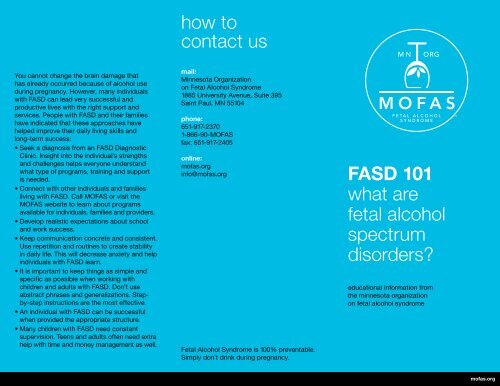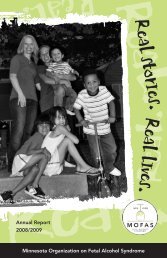FASD 101 what are fetal alcohol spectrum disorders? - Minnesota ...
FASD 101 what are fetal alcohol spectrum disorders? - Minnesota ...
FASD 101 what are fetal alcohol spectrum disorders? - Minnesota ...
Create successful ePaper yourself
Turn your PDF publications into a flip-book with our unique Google optimized e-Paper software.
You cannot change the brain damage that<br />
has already occurred because of <strong>alcohol</strong> use<br />
during pregnancy. However, many individuals<br />
with <strong>FASD</strong> can lead very successful and<br />
productive lives with the right support and<br />
services. People with <strong>FASD</strong> and their families<br />
have indicated that these approaches have<br />
helped improve their daily living skills and<br />
long‐term success:<br />
• Seek a diagnosis from an <strong>FASD</strong> Diagnostic<br />
Clinic. Insight into the individual’s strengths<br />
and challenges helps everyone understand<br />
<strong>what</strong> type of programs, training and support<br />
is needed.<br />
• Connect with other individuals and families<br />
living with <strong>FASD</strong>. Call MOFAS or visit the<br />
MOFAS website to learn about programs<br />
available for individuals, families and providers.<br />
• Develop realistic expectations about school<br />
and work success.<br />
• Keep communication concrete and consistent.<br />
Use repetition and routines to create stability<br />
in daily life. This will decrease anxiety and help<br />
individuals with <strong>FASD</strong> learn.<br />
• It is important to keep things as simple and<br />
specific as possible when working with<br />
children and adults with <strong>FASD</strong>. Don’t use<br />
abstract phrases and generalizations. Stepby-step<br />
instructions <strong>are</strong> the most effective.<br />
• An individual with <strong>FASD</strong> can be successful<br />
when provided the appropriate structure.<br />
• Many children with <strong>FASD</strong> need constant<br />
supervision. Teens and adults often need extra<br />
help with time and money management as well.<br />
how to<br />
contact us<br />
mail:<br />
<strong>Minnesota</strong> Organization<br />
on Fetal Alcohol Syndrome<br />
1885 University Avenue, Suite 395<br />
Saint Paul, MN 55104<br />
phone:<br />
651-917-2370<br />
1-866-90-MOFAS<br />
fax: 651-917-2405<br />
online:<br />
mofas.org<br />
info@mofas.org<br />
Fetal Alcohol Syndrome is 100% preventable.<br />
Simply don’t drink during pregnancy.<br />
<strong>FASD</strong> <strong>101</strong><br />
<strong>what</strong> <strong>are</strong><br />
<strong>fetal</strong> <strong>alcohol</strong><br />
<strong>spectrum</strong><br />
<strong>disorders</strong><br />
educational information from<br />
the minnesota organization<br />
on <strong>fetal</strong> <strong>alcohol</strong> syndrome<br />
mofas.org
<strong>what</strong> is<br />
<strong>FASD</strong><br />
Fetal Alcohol Spectrum Disorders (<strong>FASD</strong>)<br />
is a term used to describe a group of birth<br />
defects that can result when a woman drinks<br />
<strong>alcohol</strong> while pregnant. There <strong>are</strong> many<br />
terms under the <strong>FASD</strong> umbrella, including<br />
these medical diagnoses:<br />
• Fetal Alcohol Syndrome (FAS)<br />
• Alcohol Related Neuro-developmental<br />
Disorders (ARND)<br />
• Partial Fetal Alcohol Syndrome (pFAS)<br />
There <strong>are</strong> many other terms that may be<br />
used to indicate a diagnosis as well.<br />
<strong>FASD</strong> is a lifetime disability that affects<br />
each person differently. <strong>FASD</strong> can include<br />
physical, mental and behavioral defects.<br />
Some people with <strong>FASD</strong> have specific facial<br />
features and tend to be smaller in height<br />
and weight. They often have a brain injury<br />
that never goes away. This means both the<br />
person’s thought process and behavior may<br />
be very different from a person who was<br />
not exposed to <strong>alcohol</strong> before birth. The<br />
brain damage is the most challenging part<br />
of <strong>FASD</strong>.<br />
<strong>what</strong> causes<br />
<strong>FASD</strong><br />
The only cause of <strong>FASD</strong> is <strong>alcohol</strong> use during<br />
pregnancy. Simply put, when a pregnant<br />
woman drinks, her unborn baby drinks.<br />
We now know that no amount of <strong>alcohol</strong><br />
consumption is safe during pregnancy. The<br />
type of <strong>alcohol</strong> (beer, wine, hard liquor, etc.)<br />
does not seem to make a difference in terms<br />
of its effects on an unborn baby. Since<br />
a baby is growing throughout the entire<br />
pregnancy, it is never too late to<br />
stop drinking.<br />
Drinking <strong>alcohol</strong> up to the 13th week of<br />
pregnancy can cause:<br />
• severe brain damage<br />
• problems with the heart, liver and kidneys<br />
• miscarriage<br />
• facial malformations<br />
Drinking <strong>alcohol</strong> between weeks 14 and 26<br />
can cause:<br />
• brain damage<br />
• miscarriage<br />
• damaged muscles, skin, teeth, glands<br />
and bones<br />
Drinking <strong>alcohol</strong> between weeks 27 and 40<br />
can cause:<br />
• brain and lung damage<br />
• low birthweight<br />
• early labor and delivery<br />
from the Guidelines of C<strong>are</strong> for Children with Special Health C<strong>are</strong><br />
Needs, <strong>Minnesota</strong> Department of Health, 1999<br />
symptoms<br />
of <strong>FASD</strong> in...<br />
Infants:<br />
Low birthweight; sensitivity to light, noise and<br />
touch; irritability, inability to suck effectively,<br />
slow development, ear infections.<br />
Toddlers:<br />
Poor memory, hyperactivity, no fear or<br />
sense of boundaries, need for lots of<br />
physical contact.<br />
School-Age Children:<br />
Easily distracted, short attention span, poor<br />
coordination, trouble with both large and<br />
fine motor skills, need lots of one-on-one<br />
attention.<br />
Older Children:<br />
Low self-esteem, trouble keeping up in<br />
school, poor impulse control, difficulty with<br />
social boundaries and more.<br />
diagnosis<br />
If you or someone you know suspects<br />
prenatal <strong>alcohol</strong> use, one of the most<br />
important steps you can take is to seek an<br />
evaluation from an <strong>FASD</strong> diagnostic clinic.<br />
<strong>FASD</strong> is diagnosed by assessing<br />
four <strong>are</strong>as:<br />
1 brain function and structure<br />
2 facial features<br />
3 growth issues<br />
4 prenatal <strong>alcohol</strong> history<br />
Call MOFAS for a list of <strong>FASD</strong> diagnostic clinics.<br />
<strong>FASD</strong> is 100% preventable if women do not<br />
drink <strong>alcohol</strong> during pregnancy.<br />
mofas.org



